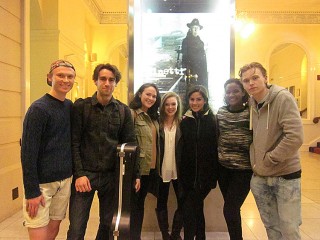Title

Marcus Crawford Guy, Steven Robertson, Francesca Carpanini, Victoria Pollack, Isabel Arraiza, Jasminn Johnson, and Gilles Geary performed at the 2014 Edinburgh International Festival.
(Photo by Will Apicella)An elderly actor is in a Belgian hotel lobby on a blustery New Year’s Eve. He’s waiting to talk to a director about his hoped-for comeback as King Lear, but as the evening wears on, his prospects grow bleaker. His pitiful diatribes about his past triumphs and trials are interrupted by bleary-eyed partygoers stumbling off to one celebration or another. They become more and more cruel to the actor as midnight approaches and it becomes increasingly clear that the director isn’t going to show up.
Body
Austrian writer Thomas Bernhard’s 1976 play Minetti (the name of the elderly actor, who’s named after a real German actor) lives stylistically somewhere near the intersection of Beckett and Pinter—it’s circular, sparse, and isolating. In August, seven Drama Division students joined seasoned U.K. actors and Royal Academy of Dramatic Arts students to premiere a new translation of Minetti at the Edinburgh International Festival. I was lucky enough to be one of the seven, along with Isabel Arraiza, Francesca Carpanini, Gilles Geary, Marcus Crawford Guy, Jasminn Johnson, and Steven Robertson.
As a retrospective on the legacy of World War II neuroses in the person of the weathered Minetti, the play raises questions about the dissolution of humanity in a post-nuclear world. It was this provocativeness that drew festival director Jonathan Mills to Minetti, he told us in rehearsal, as it aligns with the festival’s legacy of historical reflection and cross-cultural conversation. The festival, after all, was established two years after the war ended, and in the subsequent 67 years, it has served as a forum for invigorating the notion of humanity through art.
For this production, director Tom Cairns cast the Juilliard and RADA students in the roles of the Porter, the Girl, and the impulsive partygoers. Nominally British and American, we were specifically Puerto Ricans, Scots, Bosnians, and more, and we became ambassadors of the festival’s goal of providing a “platform for the flowering of the human spirit” by creating opportunities for and welcoming performers of all nationalities.
Without question, the festival and the production in particular provided an opportunity for such spiritedness to develop. Through workshops and rehearsals, we created a collective artistic language rooted in our physical and imaginative training, most notably through focus exercises and mask work. We also exchanged training practices—Juilliard students learned about RADA’s approach to voice and speech; RADA students found out about the variety of our imaginative and physical training methods.
Beyond rehearsals, there was a chance for shared cultural exposure. We explored London and Edinburgh’s parks and pubs, castles and scones as well as their theatrical tradition, absorbing the influences that guided the likes of Shakespeare, Ayckbourn, and Pinero. We saw wildly affordable theater (even West End tickets were as low as $15 to $30) and witnessed the legacy of British wit. In Edinburgh, the juxtaposition of experimental operas and 15th-century castles provided us with platforms for futurism and reflection. The Minetti experience proved that cultural exposure happens as much in rehearsal break conversations as it does in city strolls. We’re hungry to fold these new traditions, collaborative relationships, and professional experiences into our practices this year.




